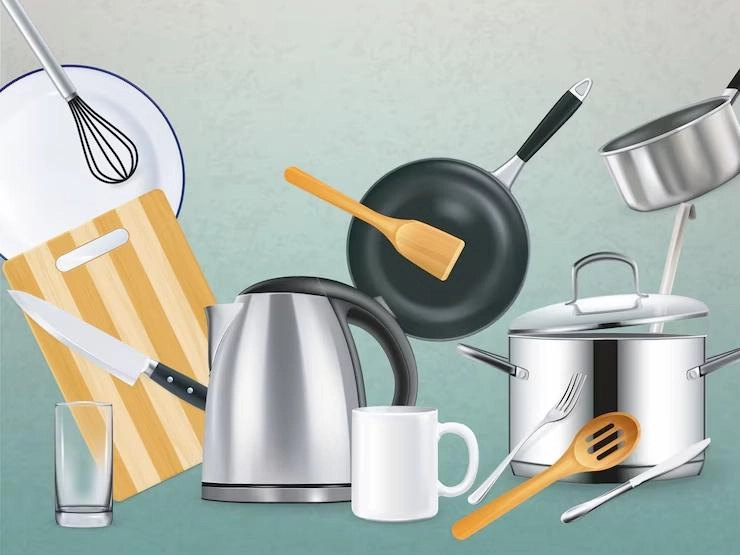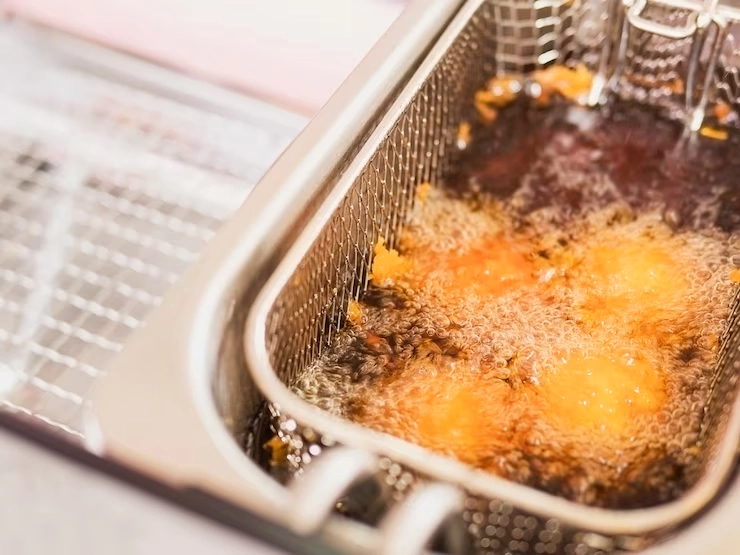5 Days a week from 8:30 am to 5:30 pm
What to Look for When Buying Professional Kitchen Equipment Supplies?
Choosing the best professional kitchen gear is vital for any food business seeking productivity and excellence. Whether you’re enhancing your eatery or launching anew, grasping essential traits, practical factors, and dependable vendors matters greatly. This guide highlights what to focus on. It ensures your kitchen flourishes with sturdy, effective, and secure tools suited to your demands.
What Features Should You Prioritize in Professional Kitchen Equipment?
When purchasing kitchen gear, targeting certain qualities guarantees lasting worth and capability. Here’s what to consider.
Material and Build: Key Indicators of Durability
The substances in kitchen tools heavily affect their lifespan and dependability. Stainless steel, for example, stands out for resisting rust and simple cleaning. Cast iron provides superb heat retention for pots, while thick aluminum promotes uniform heat spread.
- Stainless Steel: Great for fryers, stoves, and worktables; fights corrosion and marks.
- Cast Iron: Ideal for grills and skillets; tough but needs seasoning.
- Aluminum: Light yet strong for cookware and trays.
Inspect for firm assembly, like strengthened grips and smooth joints, to dodge weak spots that might break under heavy use. Items like frying baskets from reliable sources should have sturdy netting and solid frames to endure constant handling.
Energy Efficiency and Cost Savings
Power-saving devices lower running expenses and ecological harm. Seek tools with top Energy Star scores or smart features like induction heating, which consumes less energy than standard gas or electric stoves.
- Induction Burners: Warm food directly, cutting energy loss.
- LED Lights: In hoods, use less power than old bulbs.
- Smart Controls: Enable exact settings to prevent excess use.
For instance, a current range hood light with LED tech can reduce energy bills. It keeps bright lighting, boosting both savings and workspace clarity.
Safety Standards and Certifications to Consider
Safety is critical in a hectic kitchen. Gear must follow industry rules to shield workers and meet regulations.
- NSF Certification: Ensures tools meet cleanliness and safety needs.
- UL Listing: Shows electrical safety for items like ovens and fryers.
- ETL Mark: Verifies alignment with North American safety norms.
Confirm that parts like grease filters resist flames and comply with fire codes to lessen dangers in hot settings.
Factors to Consider When Purchasing Professional Kitchen Equipment
Beyond qualities, practical elements shape your buying choices. They ensure gear matches your business needs.
Quality
The Role of Quality in Ensuring Durability
Top-notch gear endures daily wear, cutting replacement costs. Seek brands known for careful crafting and strong materials. For example, a finely made fryer basket lasts through countless uses without bending. Cheaper options, however, often fail fast.
How High-Quality Equipment Impacts Efficiency and Performance
Superior gear smooths operations and boosts results. A high-performing stove with accurate heat settings cooks evenly. This reduces waste. It also lifts customer happiness. Likewise, sturdy prep tools quicken tasks. They let staff focus on creativity, not gear issues.
|
Aspect |
Low-Quality Gear |
High-Quality Gear |
|
Lifespan |
1-2 years |
5-10+ years |
|
Performance |
Uneven results |
Steady, trustworthy output |
|
Upkeep Cost |
Constant fixes |
Low maintenance |
Suitability
Matching Equipment to Your Specific Culinary Requirements
Your dishes guide gear choices. A pizza shop needs a high-capacity oven. A fancy restaurant may value a flexible stove. Review your cooking style and output to pick rightly sized and focused tools from a product center with varied options.
Maintenance and Cleaning Requirements
Easy upkeep extends gear life and keeps things clean. Choose designs with detachable parts, like removable grease traps, for fast cleaning. Non-stick coatings and dishwasher-safe pieces further ease care. They save time in busy kitchens.
- Tip: Ensure spare parts are easy to find to avoid delays.
- Example: Grease traps should detach and clean simply to keep air fresh.
Design and Layout Considerations
Optimizing Kitchen Space with Efficient Layouts
A smart kitchen plan lifts output. Small gear fits tight spaces. Modular setups offer adaptability. Think about stackable units or multi-use devices to save area.
- Tabletop Fryers: Suit small spots; simple to move.
- Racks: Store gear upward to clear floors.
- User-Friendly Design: Eases strain during long hours.
Plan your kitchen’s flow to keep often-used items, like stoves and tables, close by. This ensures smooth work.
Where Should You Purchase Professional Kitchen Equipment Supplies?
Picking the right vendor is as key as choosing the gear itself. Here’s how to decide wisely.
Comparing Local vs. Online Suppliers
Local vendors provide in-person trials and quick delivery. Yet, their stock may be small. Online vendors, like SIMPLE Kitchenware, offer huge selections and fair prices. They often include detailed specs and reviews.
|
Vendor Type |
Pros |
Cons |
|
Local |
Hands-on tests, speedy shipping |
Narrow range, pricier |
|
Online |
Broad variety, budget-friendly |
Shipping waits, no live demo |
Evaluating Supplier Reputation and Customer Reviews
A vendor’s history shows their trustworthiness. Check reviews on sites like Google or Trustpilot for clues on item quality and service. Seek steady praise for delivery speed, gear performance, and help.
- Warnings: Repeated gripes about faulty items or bad contact.
- Good Signs: Strong scores for sturdiness and quick replies.
The Benefits of Choosing Trusted Brands
Well-known brands focus on research and quality checks, ensuring steady results. They often give warranties and certified items, lowering risks. Teaming with respected names via trusted vendors ensures access to proven gear.
Introducing SIMPLE Kitchenware: Your Trusted Supplier
SIMPLE Kitchenware shines as a dependable source for professional kitchen gear, serving eateries, cafes, and food lovers. With a focus on excellence and fresh ideas, SIMPLE provides a wide array of items, from fryer baskets to grease traps, built for today’s kitchens. Their dedication to customer joy, fair pricing, and swift shipping makes them a top pick for businesses wanting reliable answers. Discover their range at SIMPLE Kitchenware to boost your kitchen work.
Why Choose SIMPLE as Your Reliable Kitchen Equipment Supplies Provider?
SIMPLE is more than a vendor—they’re a partner in your food success. Here’s why they excel.
SIMPLE’s Commitment to Quality and Innovation
SIMPLE values sturdiness and modern design. Every item, from stoves to hood lights, meets tough standards. Their gear uses the latest tech, like power-saving LEDs and easy-clean surfaces. This lifts performance and durability.
A Wide Range of Products Tailored to Diverse Needs
Whether you need special tools for a bakery or tough devices for a busy eatery, SIMPLE’s stock covers it all. Their product center has everything from small fryers to heavy stoves, fitting varied cooking styles and budgets.
Exceptional Customer Support and After-Sales Service
SIMPLE gives prompt help, guiding you through picking and setup. Their after-sales care includes fixing issues, spare parts, and upkeep advice. This ensures your gear runs well for years.
Conclusion
Choosing professional kitchen gear means weighing quality, fit, and vendor trust. Focus on tough materials, power savings, and safety approvals for lasting value. Think about your kitchen’s unique needs, from dish demands to space limits. Choose high-quality, easy-care designs. Partnering with a trusted vendor like SIMPLE Kitchenware ensures access to fresh, dependable items with great support. Equip your kitchen smartly to fuel productivity, safety, and food brilliance.
FAQs About Buying Professional Kitchen Equipment Supplies
What are the most durable materials for kitchen equipment?
Stainless steel, cast iron, and thick aluminum are top picks. Stainless steel fights rust. Cast iron holds heat well. Aluminum is light yet tough. Each fits different tools, like fryers or pots, ensuring strength in tough settings.
How often should professional kitchen equipment be maintained?
Upkeep varies by use. It often includes daily cleaning, monthly checks, and yearly expert servicing. Regular looks at parts like grease traps or fryer baskets stop breakdowns. They also keep things clean.
Are energy-efficient appliances worth the investment?
Yes, power-saving devices like induction stoves or LED hoods cut utility bills and eco-harm. Upfront costs may be steep. Yet, long-term savings and better results make them wise for active kitchens.



